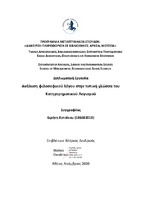| dc.contributor.advisor | Dendrinos, Markos | |
| dc.contributor.author | Κοτσίκου, Ειρήνη | |
| dc.date.accessioned | 2020-12-27T16:17:19Z | |
| dc.date.available | 2020-12-27T16:17:19Z | |
| dc.date.issued | 2020-11-27 | |
| dc.identifier.uri | https://polynoe.lib.uniwa.gr/xmlui/handle/11400/154 | |
| dc.identifier.uri | http://dx.doi.org/10.26265/polynoe-5 | |
| dc.description.abstract | Η ιστορία της επιστήμης της λογικής ανάγεται πολλούς αιώνες πίσω, στην εποχή του Αριστοτέλη, ο οποίος υπήρξε και θεμελιωτής της. Τους δύο τελευταίους αιώνες η εξέλιξη της ήταν ραγδαία και πλέον αποτελεί απαραίτητο στοιχείο σε όλες τις επιστήμες. Από τα τέλη του 19ου αιώνα, η μαθηματική λογική ανέκυψε ως φυσικό επακόλουθο της ανάγκης κατασκευής μιας αυστηρής γλώσσας για την περιγραφή περίπλοκων μαθηματικών θεωριών. Η μαθηματική λογική συναντάται και ως τυπική λογική, λόγω του αυστηρού χαρακτήρα της και συμβολική, λόγω των συμβόλων που χρησιμοποιεί αντί για λέξεις. Τα δύο σημαντικότερα είδη μαθηματικής λογικής είναι ο προτασιακός λογισμός και ο κατηγορηματικός λογισμός.
Στην παρούσα εργασία περιγράφουμε τη γλώσσα του κατηγορηματικού λογισμού και πιο συγκεκριμένα το συντακτικό, τη σημασιολογία και τους μηχανισμούς εξαγωγής συμπερασμάτων της. Στη συνέχεια επιχειρείται η μετατροπή προτάσεων φυσικής γλώσσας στην τυπική γλώσσα του κατηγορηματικού λογισμού. Πιο συγκεκριμένα, οι προτάσεις φυσικής γλώσσας που θα μεταγραφούν στη κατηγορηματική γλώσσα έχουν προέλθει από τους φιλοσοφικούς διαλόγους του Πλάτωνα. Σε αυτά τα έργα γίνεται μια προσπάθεια ορισμού μιας έννοιας, όπου από διάφορες προκείμενες προτάσεις καταλήγουν σε ένα συμπέρασμα. Τέλος, με το βασικό μηχανισμό εξαγωγής συμπερασμάτων της κατηγορηματικής λογικής, θα ελέγξουμε την ορθότητα αυτών των συμπερασμάτων. | el |
| dc.format.extent | 70 | el |
| dc.language.iso | el | el |
| dc.publisher | Πανεπιστήμιο Δυτικής Αττικής | el |
| dc.rights | Αναφορά Δημιουργού-Μη Εμπορική Χρήση-Όχι Παράγωγα Έργα 4.0 Διεθνές | * |
| dc.rights.uri | http://creativecommons.org/licenses/by-nc-nd/4.0/ | * |
| dc.subject | Κατηγορηματικός Λογισμός | el |
| dc.subject | Κατηγορηματική Λογική | el |
| dc.subject | Λογική Πρώτου Βαθμού | el |
| dc.subject | Πρωτοβάθμια Λογική | el |
| dc.subject | Λογική | el |
| dc.subject | Πλατωνικοί Διάλογοι | el |
| dc.subject | Πλατωνικά Έργα | el |
| dc.subject | Επεξεργασία Φυσικής Γλώσσας | el |
| dc.subject | Predicate Logic | el |
| dc.subject | Predicate Calculus | el |
| dc.subject | First-Order Logic | el |
| dc.subject | Logic | el |
| dc.subject | Platonic Dialogues | el |
| dc.subject | Platonic Works | el |
| dc.subject | Natural Language Processing | el |
| dc.title | Ανάλυση φιλοσοφικού λόγου στην τυπική γλώσσα του Κατηγορηματικού Λογισμού | el |
| dc.title.alternative | Philosophical discourse analysis in the typical language of Predicate Calculus | el |
| dc.type | Μεταπτυχιακή διπλωματική εργασία | el |
| dc.contributor.committee | Kyriaki-Manessi, Daphne | |
| dc.contributor.committee | Giannakopoulos, Georgios A. | |
| dc.contributor.faculty | Σχολή Διοικητικών, Οικονομικών & Κοινωνικών Επιστημών | el |
| dc.contributor.department | Τμήμα Αρχειονομίας, Βιβλιοθηκονομίας και Συστημάτων Πληροφόρησης | el |
| dc.contributor.master | Διαχείριση Πληροφοριών σε Βιβλιοθήκες, Αρχεία, Μουσεία | el |
| dc.description.abstracttranslated | The history of the science of logic dates back many centuries, to the time of Aristotle, who was also its founder. In the last two centuries its evolution has been rapid and is now a necessary element in all sciences. From the end of the 19th century, mathematical logic emerged as a natural consequence of the need to construct a rigorous language to describe complex mathematical theories. Mathematical logic is found both as formal logic, due to its strict nature, and as symbolic, due to the symbols it uses instead of words. The two most important types of mathematical logic are propositional calculus and predicate calculus.
In the present work, we describe the language of predicate calculus and more specifically its syntax, semantics and mechanisms for drawing conclusions. Then, the conversion of propositions of natural language into the standard language of predicate calculus is attempted. More specifically, the propositions of natural language that will be translated into the predicate language have come from Plato's philosophical dialogues. In these works an attempt is made to define a concept, where from various premises they come to a conclusion. Finally, with the basic mechanism of drawing conclusions of categorical logic, we will check the correctness of these conclusions. | el |


